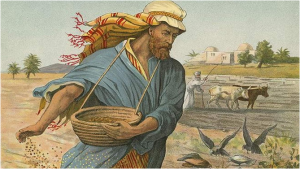The Parable of the Sower
Mike Johnson
 One of the most familiar parables taught by Christ is the “Parable of the Sower.” We know that a teacher has an important responsibility. This parable, however, makes the essential point that hearers have a critical obligation also.
One of the most familiar parables taught by Christ is the “Parable of the Sower.” We know that a teacher has an important responsibility. This parable, however, makes the essential point that hearers have a critical obligation also.
The Parable of the Sower is in three of the four accounts of the life Christ (Mt. 13:1-9, 18-23; Mk. 4:1-9, 14-20; Luke 8:4-8, 11-14). This parable is different from many as Jesus not only presents it but also explains the meaning.
Sower, Soils, and Seed
To begin with, note that there are three main ingredients in this parable. They are: the sower, the seed, and the various soils. The sower represents the teacher of God’s Word. The seed is the Word of God (Luke 8:11), and the soils represent the hearts of various hearers. All three of these ingredients are necessary for successful results in teaching God’s Word.
In the parable, the proper “soil” was missing in all three cases of failure, even though the sower and the good seed were present.
Wayside Soil
The first soil to consider is the wayside soil. In Matthew 13:4. Jesus said that some seed fell on this type of soil, “and the birds came and devoured them.” Luke’s account says the seed was trampled down. A garden might typically have a packed down path leading to it, which can be as hard as asphalt. If seeds fall in this area, they will not grow, and the birds would probably eat them.
Christ said that the seed falling on the wayside represents a person who hears the Word of the kingdom and does not understand it. Satan (the wicked one) snatches away the seed sown in this person’s heart (Mt. 13:19).
The person described here may have been like the Pharisees of Christ’s day. Jesus spoke of those with this attitude in verse Matthew 13:15 by saying that their hearts have grown dull; their ears are hard of hearing, and they have closed their eyes. Many people are like this today when someone attempts to teach them. They will not understand because they have shut their eyes to God’s saving message.
Stony Places
The next soil is the stony soil. Perhaps this involved a layer of rock close to the surface with just a thin layer of earth over it. The seed grows very fast at first, but finally, it dies. Luke 8:6 says, “. . . as soon as it sprang up, it withered away because it lacked moisture.”
Jesus points out that this soil represents one who immediately, with joy, receive the Word but falls away when tribulations and persecutions arise. Luke 8:13 says that he believes for a while, but, in times of temptation, falls away. There may be cases today when a person obeys the gospel and is very enthusiastic at first but is not deep-rooted, and is without strong convictions. This person falls away when he starts to feel the pressures of temptation and persecution. Paul admonishes in Colossians 2:7 to be “rooted and built up in Him and established in the faith. . . .”
There are at least two ways to react to tribulation. People can fall away as the stony ground person, or they can face these events with joy, (Mt. 5:10-12), realizing that “tribulation produces patience …” (Rom. 5:3). Patience is also a necessary element in keeping us from falling (2 Pet. 1:6, 10).
Thorny Soil
The third soil is the thorny soil. In Matthew 13:7, Jesus points out, “And some fell among thorns, and the thorns sprang up and choked them.” The thorny plants would have roots occupying large areas, and also they would take moisture from other plants. Further, their leaves would block out the light.
Jesus indicates in Matthew 13:22 that this man is “he who hears the word, and the cares of this world and the deceitfulness of riches choke the word, and he becomes unfruitful.” This person would be someone who puts fleshly matters ahead of spiritual issues. Matthew 6:33 points out that we must seek first God’s kingdom. We are not to put our job, family, or a desire to make more money over the church and serving God. Matthew 6:24 says we “… cannot serve God and mammon.”
One of the factors that caused this individual to fall was the “deceitfulness of riches.” There might be several reasons for calling riches deceitful. Perhaps one is that they promise to make us happy, but in reality, they do not. 1 Timothy 6:10 reveals, “For the love of money is a root of all kinds of evil, for which some have strayed from the faith in their greediness, and pierced themselves through with many sorrows.” In summation, the thorns would represent whatever crowds Christ out of our lives.
Good Ground
The good ground represents one who hears the Word, understands it, and bears fruit. This ground represents people who are thoroughly influenced by God’s Word. These people are different from those described by the wayside in that they understand God’s Word, and do not allow Satan to snatch it away. They are different from the stony ground as they endure tribulation and persecution, and from the thorny soil as they do not let the cares of the world and the deceitfulness of riches cause them to fall away. Hopefully, the good ground describes each of us.

